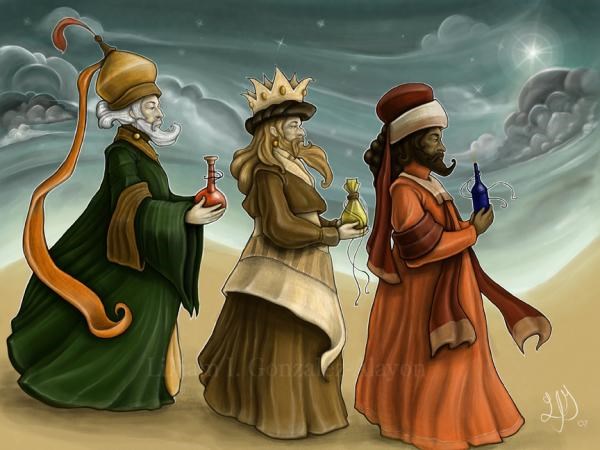Gift-giving must be one of our oldest rituals. I’ll bet cave dwellers already indulged in it, making a present of pretty pebbles or seashells. And there’s plenty of evidence that in ancient civilizations, gifts were offered to the deities, as well as to mortals.
Our Western custom of giving Christmas presents belongs to a tradition that started in northern Europe, becoming firmly established in the 19th century, alongside Santa Claus and the Christmas tree.
For some, the tradition began in the East, with the Three Wise Men bringing the Christ Child gifts of gold, frankincense and myrrh (two aromatic gum resins with special properties). As a matter of fact, before commercialisation and consumerism took over our lives, the products of nature and confections made with natural products were the most common types of gifts bestowed on special occasions, such as Christmas or Easter.
In my research on the Italian nobility, I learned that in the Renaissance they customarily regaled those on their gift list with items from their cellars or larders.
The preciousness and rarity of the gift corresponded to the social rank or political importance of the recipient, since gifts served not only to honour but also to curry favours. While charitable bodies, such as religious institutions, could be fobbed off with inferior products, a cardinal who had the ear of the pope would receive only the very best.
For instance, the Della Rovere family, who ruled the Italian duchy of Urbino in the 16th and 17th centuries, prided themselves on the figs grown in their region. Picked in the late summer, the figs were dried during the autumn, and in the winter the choicest fruits were selected to be sent to worthy dignitaries. Figs marred by pests or inclement weather were destined for the nuns.
This venerable tradition of offering edible delicacies persists in parts of Italy. At Easter, one of the tributes regularly received by my friend’s father, an eminent judge, was an enormous marzipan fish, made by the local nuns with local almonds. Other people brought him lobsters.
Not surprisingly, a few of the words in the vocabulary of gift giving originally had religious (pagan or Christian) associations: offer, donate (from the Latin “donum,” gift), bestow.
Other words (not only in English) are connected with food and drink. For example, the German word “schenken” means to give a present as well as to pour a drink. Although there’s no English word akin to “schenken” that signifies gift-giving, “schenken” is related to the Old English “sceanca,” shank in modern English (it’s been suggested that early on, taps in barrels were fashioned from shanks).
One significance of the verb regale is to gratify someone with a gift. Regale comes from the French “régaler,” to feast, banquet, which derives from the Old French “gale,” pleasure, merriment. The same French source is at the root of the Italian word for gift, “regalo.”
There’s much to praise in the old traditions of gift giving — exquisite food and drink provide pleasure, satisfy appetites and don’t end up on the landfill.
Sabine Eiche is a writer and art historian (Members.Shaw.ca/seiche)



